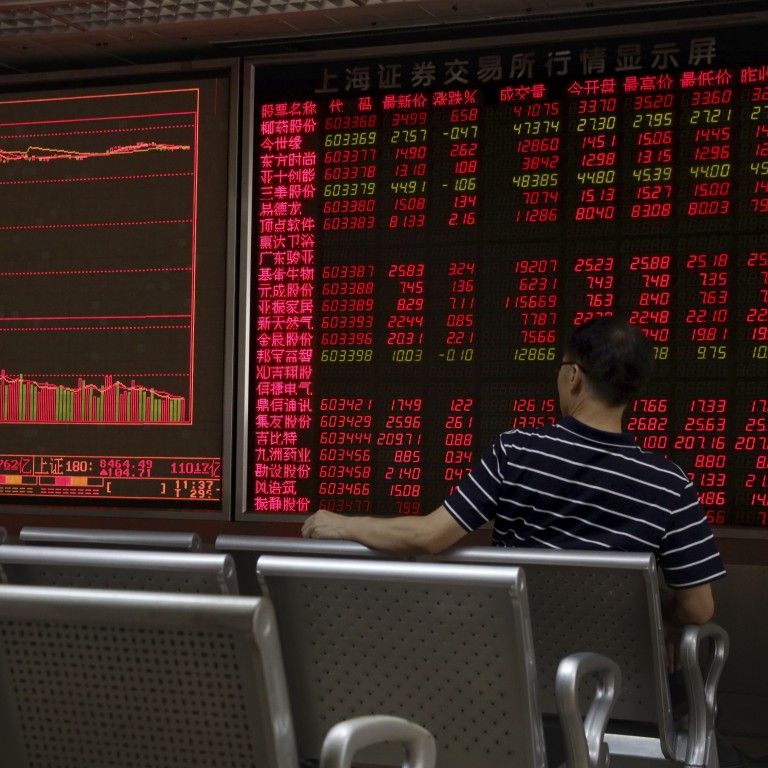
China STAR Market stocks lose trader interest as ‘temporary craziness’ wears off, curbs kick in
- As of Monday, the original 25 STAR stocks have a 20 per cent maximum up or down limit
- Last week, with no brakes, one stock shot up 520 per cent at one point
China’s new tech board saw one of its first 25 listed companies soar by as much as 520 per cent in trading last week. Now, as curbs on daily gains or losses kick in, investors have lost a lot of their appetite.
“We have seen so many things like this happen before. There was a kind of euphoria last week, and if you build a stock to a sky high level, in the near term there is bound to be profit-taking, or a slowdown,” said Louis Tse Ming-kwong, managing director of VC Asset Management.
“We have to face reality. Investors in China realise this: It is temporary speculation and a short-term increase because of a new board promoted by the president of China. That doesn’t mean every one of [the companies] has good earnings prospects.”
Tse calls last week’s trading “temporary craziness.”
China’s stock markets are often likened to casinos, and last week’s frenzied trading showed why.
The new STAR Market board, an initiative of President Xi Jinping, had its first 25 initial public offerings. The IPOs were 1,690 times oversubscribed, and raised a total of 37 billion yuan (US$5.4 billion), siphoning off money for trading in other markets.
Partly driving the frenzy was this: stocks for the first week on the board can trade without limits.
In the second week, they can trade up or down by a maximum of 20 per cent in day. In the rest of China’s markets, stocks can jump 44 per cent on their first trading day, before being limited to a 10 per cent daily rise from then on.
By the close of trading on Monday, just one of the original stocks, high-precision diamond cutting tools manufacturer Beijing Worldia Diamond, had hit the daily 20 per cent cap. It saw a turnover of 463.34 million yuan.
All 25 stocks were trading higher, but just seven others had jumped more than 10 per cent by close.
Among the top movers, Suzhou Hanchuan Intelligence Tech gained 13.85 per cent to 58.86 yuan, with 714.9 million yuan of turnover. XiAn Bright Laser Technologies grew 13.75 per cent to 76.60 yuan, with 574.3 million yuan of turnover, and Beijing Piesat Information Technology was up 13.6 per cent to 60.88 yuan, seeing 1.1 billion yuan of turnover.
The biggest stock on the board, China Railway Signal & Communication, rose the least, by just 2.7 per cent. But it saw the largest turnover, at 2.03 billion yuan.
A total of 20.7 billion yuan changed hands on Monday. The daily average was 28.56 billion yuan last week, and Friday’s 19.6 billion yuan was the lowest daily amount.
Monday marks a stark contrast to a wild first week of trading in the STAR Market.
On its debut day, stocks shot up an average 140 per cent. Semiconductor manufacturer Anji Microelectronics Technology led the force, rocketing up 400 per cent by close after an intraday high of 520 per cent.
A volatile week ensued. A total of 21 stocks saw their shares tumble on Tuesday as investors took profits, sending the day’s turnover to less than half of the previous trading session. Many bounced back, but none recovered from initial highs, and turnover stayed markedly lower.
Future performance of the board depends on companies’ individual performances, said Tse, and “not the temporary craziness.”
“It is the earnings, the prospects, the management that counts,” he said. “I am still adopting a wait-and-see approach.”

